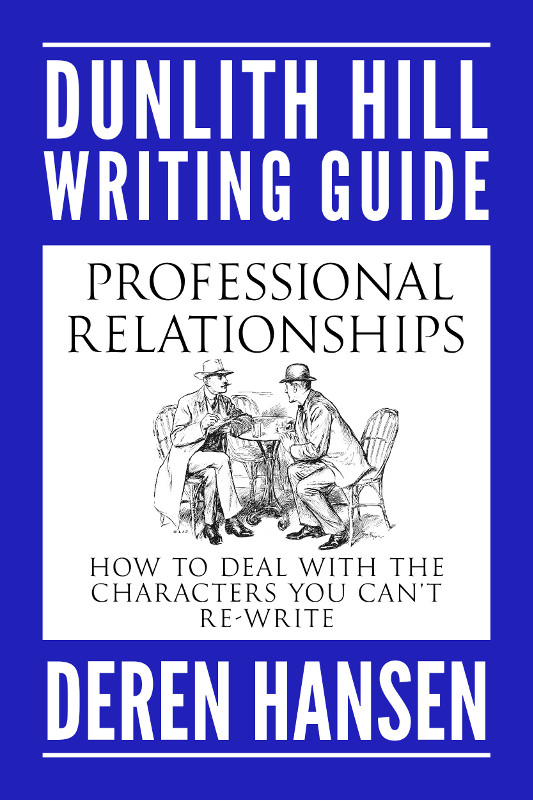
Description
For good or ill, once money enters the picture you become a professional writer: even if you’ve never received a penny for your words, as soon as you try to sell them—to agents, editors, or the public—the nature of many of your social relationships changes. People will no longer care about you; they’ll only care about what you and your writing can do for them.
This guide looks at all the people who will be involved in buying and selling your books, what you need to understand about them, and how to deal with them. Using the principles in Dale Carnegie’s, How to Win Friends and Influence People, as a framework, you will learn how the mantra of the professional—“I have no problems; I cause no problems; I solve your problems”—is the key to your success as a writer.
Purchase
Chapter 1: It’s Not About You
When asked where they get their ideas, writers often say they listen to the voices in their heads. Perhaps it’s because they want readers to experience their characters as vivid and self-willed. And yet the rarely acknowledged fact of the matter is that those characters can always be rewritten.
Unfortunately that’s not true for characters that exist outside your head. Other people—real people—have an annoying tendency to go off-script and you have no other option but to take them as they are.
While you can’t correct people with a flourish of your pen, the good news is there are time-honored—and time-tested—ways of interacting with other people to create and build relationships that even writers can master.
Old School Networking and Social Media
Dale Carnegie’s How to Win Friends and Influence People was originally published in 1936. How could an advice book published before World War II still be relevant?
Publishing, like nearly everything else in our lives, is fundamentally about human relationships. And people haven’t changed much over the last century. If you brush aside the cobwebs and blow away the dust, you’ll find Carnegie’s ‘40s-era advice is as good as or better than the latest pearls of wisdom from social networking gurus.
And what does Carnegie advise?
Here’s a summary of the principles of How to Win Friends and Influence People:
Fundamental Techniques in Handling People
- Don’t criticize, condemn, or complain.
- Give honest and sincere appreciation.
- Arouse in the other person an eager want.
Six Ways to Make People Like You
- Become genuinely interested in other people.
- Smile.
- Remember that a man’s Name is to him the sweetest and most important sound in any language.
- Be a good listener. Encourage others to talk about themselves.
- Talk in the terms of the other man’s interest.
- Make the other person feel important and do it sincerely.
Twelve Ways to Win People to Your Way of Thinking
- Avoid arguments.
- Show respect for the other person’s opinions. Never tell someone they are wrong.
- If you’re wrong, admit it quickly and emphatically.
- Begin in a friendly way.
- Start with questions the other person will answer yes to.
- Let the other person do the talking.
- Let the other person feel the idea is his/hers.
- Try honestly to see things from the other person’s point of view.
- Sympathize with the other person.
- Appeal to noble motives.
- Dramatize your ideas.
- Throw down a challenge and don’t talk negative when the person is absent, talk about only positive. [1]
How does this apply to writers?
The key to winning friends and influencing people, in both the art and business of writing, is empathy. You can’t capture characters or readers without it.
Empathy is no more or less complicated than putting the other person first.
The single most important take away from Surviving the Writing Life, the first of the Dunlith Hill Writers’ Guides, is that it’s not about you: the vast majority of the people with whom you’ll do business as a writer—particularly your readers—care about a relationship with you only because of what’s in it for them.
This volume takes that theme and, using Carnegie’s principles as a framework, explores the ways in which you can navigate the variety of professional relationships you’re likely to have as a writer.
We begin with a careful look at Carnegie’s three fundamental techniques in handling people and how those techniques provide the foundation for your professional relationships as a writer. Chapters two through four explore, “Don’t Criticize, Condemn, or Complain,” “Give Honest and Sincere Appreciation,” and “Arouse in the Other Person an Eager Want.”
Chapter five covers approaching and working with agents.
In chapter six, we’ll consider Carnegie’s, “Six Ways to Make People Like You,” and then look at particular applications of those principles as you find and build your audience in chapter seven.
Chapter eight reviews Carnegie’s, “Twelve Ways to Win People to Your Way of Thinking,” which we apply in chapter nine’s introduction of a principled approach to marketing and promotion.
In the world before pervasive interconnectivity, getting published was the writer's holy grail because the publisher, who controlled the book distribution system, was the key to getting into the bookstores and ultimately finding readers. Now writers have additional ways to reach readers. And, more importantly, readers have ways to find and acquire books that don't include bookstores.
Tracy Hickman summarized the new reality for writers:
- “What makes you an author? Readers.”
- “The challenge now is to find your audience, not your publisher.”
- “The future of publishing is to find, connect with, and maintain your audience.”
The way in which you establish a professional relationship with your readers makes all the difference. And the key is to remember: it’s not about you the author; it’s about what you, the author, can do for your readers.
Table of Contents
1: It’s Not About You |
||
2: Don’t Criticize, Condemn, or Complain |
||
3: Give Honest and Sincere Appreciation |
||
4: Arouse in the Other Person an Eager Want |
||
5: Agents |
||
6: Carnegie’s Six Ways to Make People Like You |
||
7: Audience |
||
8: Carnegie’s Twelve Ways to Win People to Your Way of Thinking |
||
9: Marketing and Promotion |
||
10: At the Summit |
||
Appendix: Author Platforms in the Age of Abundance |
About the Author
Deren Hansen
Trained as an anthropologist, engineer, and historian, Deren Hansen brings a unique structural perspective to the conversation about writing and the writing life.





